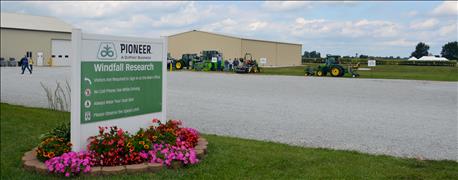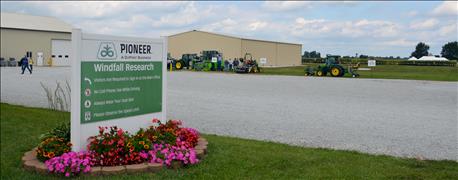
DuPont Pioneer introduces what the company is billing as a new class of soybean varieties. Available for 2017, Pioneer calls this class the A-Series. The series includes 54 new varieties nationwide for maturities from Group 000 to Group 7.
In the eastern Corn Belt and North Atlantic regions, representatives say 28 new A-Series varieties will be available, depending upon location. Maturity of these varieties ranges from Group 08 to early Group 5.
Seventeen of the new varieties in the eastern Corn Belt represent Roundup Ready 2 Xtend technology. There are also LibertyLink, DuPont STS, conventional and Plenish varieties included in the package.

KEY INVESTMENT: Starting a soybean breeding program at the Windfall, Ind., testing location in 2014 with Charlie Zilo, a soybean breeder, was one of DuPont Pioneer's investments that led to the A-Series varieties release.
Plenish soybeans are raised and sold on contract to produce Plenish cooking oil.
“Our breeding program here in Napoleon, Ohio, is the epicenter for developing Plenish varieties,” says Reid Rice, a soybean breeder stationed at the facility. “We developed the first A-Series Plenish variety here.”
New technology platform
What Pioneer calls its highest-yielding line of soybeans ever was developed as breeders used the company’s Accelerated Yield Technology 4.0 platform, abbreviated AYT 4.0. Rice and other plant breeders say this new technology doubles the rate of genetic gain and reduces the time it takes to get varieties from conception to the commercial lineup.
Pioneer representatives say the A-Series project actually began through a continuation of Pioneer’s intensive, localized testing program that plant breeders use to evaluate performance. Thousands of on-farm weighs in farmer side-by-side field trials are conducted each year. Nationally, the number totals 50,000 on-farm weighs, counting both corn and soybean trials.
The testing program helps provide the base that turns out varieties suited to localized environments, Pioneer officials say.
Key investments
Charlie Zilo was one of the featured speakers when Pioneer officially unveiled the A-Series varieties, and he was included for a reason. Stationed at Windfall, Ind., Zilo started the first Pioneer soybean breeding program at Windfall, and the first in Indiana, three years ago.
Besides yields, Zilo says plant breeders are also focusing on other factors important to yield. “At our station, we focus on things like resistance to phytophthora root rot, soybean cyst nematode, brown stem rot, white mold and sudden death syndrome,” he says.
Zilo says Pioneer made intentional investments in five key areas related to soybean development, and those investments are paying off through the release of A-Series varieties. Those areas are:
1. New breeding program. “Establishing a new breeding program here at Windfall was a big commitment,” Zilo says.
2. Increased experimental testing. The extensive and intensive testing program makes a huge difference, Zilo says.
3. Solutions for key diseases. Screening for phytophthora root rot and white mold, in particular, in the eastern Corn Belt produced results, Zilo adds.
4. SCN research. Zilo and his team are particularly focused on resistance to Race 1 and Race 5 of SCN.
5. Full development of AYT 4.0 platform. This technology allows plant breeders to sort through materials faster and more efficiently, Zilo says. The end result is that Pioneer can bring improved varieties to the market about one year sooner than in the past, he concludes.
About the Author(s)
You May Also Like




